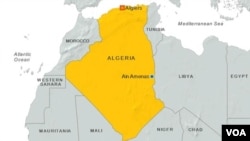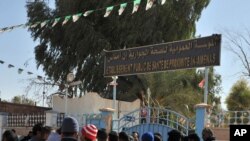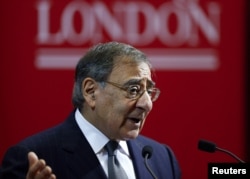U.S. Secretary of State Hillary Clinton said she is "deeply concerned" about the ongoing hostage crisis in Algeria, and called on the Algerian government to do everything in its power to save lives.
Clinton spoke during a joint appearance with the new Japanese foreign minister Friday in Washington as new reports from Algerian state media said at least 12 Algerians and foreigners had died after an assault by the Algerian army.
U.S. officials confirmed late Friday that one American, Frederick Buttaccio, was among the dead.
Clinton called the situation "extremely difficult and dangerous," but said because of the security concerns, she could not provide further details. She also said it is absolutely essential for the United States to" broaden and deepen" counter-terrorism efforts with Algeria and all countries of the region.
Earlier, Algeria's state news agency said nearly 100 foreign hostages seized by Islamist militants on Wednesday had been freed, with more than 30 others still unaccounted for.
Friday's report, citing an unnamed security source, said militants seized a total of 132 foreign hostages in their raid at a natural gas complex in eastern Algeria Wednesday.
The news agency reports the Algerian rescue operation continues, and that special forces are negotiating with militants still holding a group of hostages.
Images Friday from Algerian television showed some of the rescued hostages thanking the Algerian military.
RESCUED HOSTAGE:"We are lucky that we are still alive and everything is good.
REPORTER: What do you think of army, of Algerian Army?
RESCUED HOSTAGE: They are a bit noisy. They are a bit noisy."
It was not clear whether the hostages reported to be freed were rescued by the Algerian army or released by their captors, and there has been no Western confirmation of the report.
The hostages at the site are believed to include nationals from the U.S., Britain, Japan, Norway, Romania, the Philippines, France, Malaysia and Austria.
Earlier Friday, U.S. State Department spokeswoman Victoria Nuland described the situation as fluid and complicated. "They [the Algerians] are dealing with people who have no respect for human life and it is obviously in our interest to see them successfully bring this situation to a conclusion," she said.
Story continues below
Officials in the U.S., Britain and other countries have said they are seeking information about developments at the plant - while expressing regret Algeria did not inform them in advance about the military operation.
British Prime Minister David Cameron told lawmakers Friday that he got an update from Algeria's prime minister. "He said that the terrorists had tried to flee, that they judged there to be an immediate threat to the lives of the hostages and had felt obliged to respond," he said.
"When I spoke to the Algerian prime minister later last night he told me that this first operation was complete but this is a large and complex site and they are still pursuing terrorists and possibly some of the hostages in other areas of the site,"Cameron said.
The White House said Friday that President Obama is getting regular updates from security officials on the situation in Algeria.
U.S. Defense Secretary Leon Panetta is in London and met with Prime Minister Cameron on Friday. Officials said they discussed Algeria, Mali, and other issues.
During a speech at London's King's College, Panetta said terrorists who attack Americans "will have no refuge - not in Algeria, not in North Africa, not anywhere."
Speaking during a trip to Perth, Australia, British Foreign Secretary William Hague warned the Algerian kidnapping is part of a much more worrisome problem.
"This terrible incident of terrorism has highlighted again the threat in North Africa and the Sahel, from international terrorism, and working with our international partners we will maintain our resolve to see that threat countered and defeated and al-Qaida denied a foothold on Europe's southern border," said Hague.
In France, French Interior Minister Manuel Valls also raised concerns about militant groups and links to Europe.
"For years, there have been French jihadis who have gone to fight a war in Afghanistan, in Syria, and a very small handful in the Sahel. They are obviously being watched by our intelligence agencies," said Valls.
The militants, who said they attacked the facility in retaliation for French military operations in Mali, on Friday threatened more attacks. A spokesman for the group told the Mauritanian news agency ANI that Algerian forces should stay away from foreign companies, vowing to strike "where it is least expected."
The gas complex, located on a base in a remote area of the desert, is jointly run by Algerian, British and Norwegian firms.
Clinton spoke during a joint appearance with the new Japanese foreign minister Friday in Washington as new reports from Algerian state media said at least 12 Algerians and foreigners had died after an assault by the Algerian army.
U.S. officials confirmed late Friday that one American, Frederick Buttaccio, was among the dead.
Clinton called the situation "extremely difficult and dangerous," but said because of the security concerns, she could not provide further details. She also said it is absolutely essential for the United States to" broaden and deepen" counter-terrorism efforts with Algeria and all countries of the region.
Earlier, Algeria's state news agency said nearly 100 foreign hostages seized by Islamist militants on Wednesday had been freed, with more than 30 others still unaccounted for.
Friday's report, citing an unnamed security source, said militants seized a total of 132 foreign hostages in their raid at a natural gas complex in eastern Algeria Wednesday.
The news agency reports the Algerian rescue operation continues, and that special forces are negotiating with militants still holding a group of hostages.
Images Friday from Algerian television showed some of the rescued hostages thanking the Algerian military.
RESCUED HOSTAGE:"We are lucky that we are still alive and everything is good.
REPORTER: What do you think of army, of Algerian Army?
RESCUED HOSTAGE: They are a bit noisy. They are a bit noisy."
It was not clear whether the hostages reported to be freed were rescued by the Algerian army or released by their captors, and there has been no Western confirmation of the report.
The hostages at the site are believed to include nationals from the U.S., Britain, Japan, Norway, Romania, the Philippines, France, Malaysia and Austria.
Earlier Friday, U.S. State Department spokeswoman Victoria Nuland described the situation as fluid and complicated. "They [the Algerians] are dealing with people who have no respect for human life and it is obviously in our interest to see them successfully bring this situation to a conclusion," she said.
Story continues below
Officials in the U.S., Britain and other countries have said they are seeking information about developments at the plant - while expressing regret Algeria did not inform them in advance about the military operation.
British Prime Minister David Cameron told lawmakers Friday that he got an update from Algeria's prime minister. "He said that the terrorists had tried to flee, that they judged there to be an immediate threat to the lives of the hostages and had felt obliged to respond," he said.
"When I spoke to the Algerian prime minister later last night he told me that this first operation was complete but this is a large and complex site and they are still pursuing terrorists and possibly some of the hostages in other areas of the site,"Cameron said.
The White House said Friday that President Obama is getting regular updates from security officials on the situation in Algeria.
U.S. Defense Secretary Leon Panetta is in London and met with Prime Minister Cameron on Friday. Officials said they discussed Algeria, Mali, and other issues.
During a speech at London's King's College, Panetta said terrorists who attack Americans "will have no refuge - not in Algeria, not in North Africa, not anywhere."
Speaking during a trip to Perth, Australia, British Foreign Secretary William Hague warned the Algerian kidnapping is part of a much more worrisome problem.
"This terrible incident of terrorism has highlighted again the threat in North Africa and the Sahel, from international terrorism, and working with our international partners we will maintain our resolve to see that threat countered and defeated and al-Qaida denied a foothold on Europe's southern border," said Hague.
In France, French Interior Minister Manuel Valls also raised concerns about militant groups and links to Europe.
"For years, there have been French jihadis who have gone to fight a war in Afghanistan, in Syria, and a very small handful in the Sahel. They are obviously being watched by our intelligence agencies," said Valls.
The militants, who said they attacked the facility in retaliation for French military operations in Mali, on Friday threatened more attacks. A spokesman for the group told the Mauritanian news agency ANI that Algerian forces should stay away from foreign companies, vowing to strike "where it is least expected."
The gas complex, located on a base in a remote area of the desert, is jointly run by Algerian, British and Norwegian firms.









